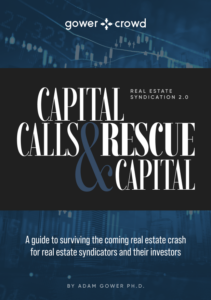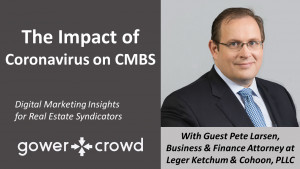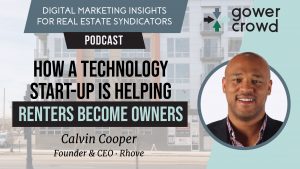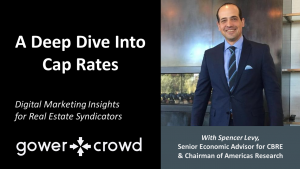238 Pete Asmus, Founder, CEO Greenzone 360
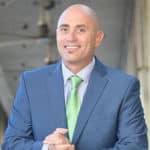
Pete Asmus, Greenzone 360
When I was a kid, my parents were both, probably, middle class, but I just had an issue, I guess, listening. And so, I was kicked out, and I lived on the streets when I was 16 years old. It was definitely a different day back then. Like, now, I can't even imagine that. But back then, it was, "Look, you're not listening. You're not doing what you're told. You've got go out. You've got to get out of here."
And so, literally, from the time I was 16, I never lived with my parents again. I ended up going into a group home. And it really, I think, to some degree, developed the desire and drive in me to prove to everybody that I was worth being there. And I know I'm getting mushy right off the bat, but, really, I think, that was my driver. And I think that has a big driver. And anybody that's truly successful, there's got to be something that's eating a way at you that's making you want to do better, and better, and go for it.

Early Days
And so, I ended up going to Portland State. I ended getting a -- I almost got a BA, and I ended up starting a sketch comedy group while I was in college. And that really transitioned me for the next four or five years because I was out running around, developing, and really being an entrepreneur at a young age going, "How do we get this comedy group to make money? And how do we live?" And so, we did that. And as we kept going, we tend to hit a block wall of where we couldn't get really any farther. And so, I ended up coming back down to California, and I said, "I've got to make a change. I want to make more out of my life. I know that I'm destined to be something."
And so, as we kept going through, and I was working, I ended up working at a gym and running a gym. And I just kept seeing the same thing over and over every single job I had. And it was always as, I was working at a company, I would shoot for the top, and then I would get frustrated because I was limited. And that's when I realized I needed to be an entrepreneur. And I think, you can identify with that, right?
I started working at a car dealership. And I love this story because I'm working with car dealership, and I hate it. I'm doing very well, and I was the top salesman, but I hated it because in order to work in a car dealership, you got to -- Look, I've got to tell your car's worth less than it is in order for us to make a profit. I didn't like that. So, I started writing down every day, I'm going to meet somebody that is going to change my life. I will meet somebody that is going to take me out of here. I'm going to meet somebody for the change of life. I literally started writing that.
Leaders of The Crowd
Conversations with Crowdfunding Visionaries and How Real Estate Stole the Show
Discover how laws that gave us crowdfunding were solely meant to finance small companies and yet inadvertently opened the doors to allow you to invest in real estate like never before.
Read the book and listen to the actual conversations.
Discovering Real Estate
Three months later, I met a gentleman who brought me on to a company called Aquagen, who, at the time, had one distributor that they were selling at. They had done $5000 that whole entire year. And the year that I came on, when I came on, within that year, we had already gotten it to $500,000, we were across the country to Texas, and we were blowing up. And then, my son got brain cancer and shut me down. And that's the point I realized I needed to be an entrepreneur. I needed to be able to control my own destination because I never wanted to be in a situation again where I had to work, and I couldn't take care of my family. I couldn't be there for my family.
And so, at that point, because of everything that I was doing, I ended up traveling two weeks out of the year working for like Robert Allen or Armando Montelongo, these real estate gurus, and I was out every weekend doing this. And the more I was doing that, the more I get that same feeling like when I was at the car dealership where, "Man, all these people talking about what they're doing." They're not really doing. They're just talking about it. I'm selling you on how to repair houses, but I'm not actually repairing houses because I think it's too dangerous right now. And that mentality was insane to me.
Related Article: Cannabis Real Estate in The United States
How to Fund Your Deals
7 Steps to Raising Equity Online
Greenzone 360
And so, at that point, I started a review. And it was really all about, how do we help people? There were two things. And the reason I'm telling you this story is because it leads into where I'm at now. When I was traveling around the country working with all of these different gurus, there were two things that kept coming up with every investor that came in. And the two things were they needed to make money now, but they needed to make money long term. And, really, what these programs would offer them one or the other. Look, you either can get wrinkles. And then, all your money is in this rental. And, now, you're making $700 or $800 a month. Or you can do this split, and, hopefully, this goes well because if it doesn't, you're going to lose everything. But if it does, well, great. Now, you have money, but you've got to do it again. See what I mean?
And so, my thing was, how do we solve that? How do we solve that problem? And that kind of leads me up to Green Zone.
Because my thing ever since that was, how do I solve those two problems? How do I solve those two problems for our investors? And what we started to realize was when we looked at what was happening in cannabis, when we looked at what was happening in the country, we started seeing a trend. Colorado was like its own little thing. But then, it was Washington, and it was Washington DC. Then, it was Oregon. And you're having all these other thieves coming online.
And, really, what that was showing was this green rush. It was showing the ability of states to start making their own decision despite what federal government was doing. And a lot of times, people, right now, are going, "What is federal government going to do? What are the repercussions?" And the reality is, well, the repercussions be anything because it's a scheduled one drug. However, if you look at the past, for the last five years, Colorado has been making millions and millions of dollars.
Development in the Desert
In fact, in 2016. 85% of their income came from the black market. It came from the black market. Meaning the 85% of that money was going anyway. It was being spent on candidates, except it was being put into drug dealers' pockets. It was being sent out of the country. Now, it's staying in the country. And my biggest thing is whether you're four candidates are against it, wouldn't you want to control it to ensure that it's as safe as possible? And really everybody's answer is being yes, right?.
Going back to the Gold Rush, because of a lot of people are really assimilating the California Green Rush with the Gold Rush, right. And when I started thinking about that, I started thinking, "Well, who made money in the Gold Rush?" Very few people making gold or finding gold made money. Who made all the money? The people that were renting the hotels, the people that were selling the shovels.
How do we find the golden shovels? Where the golden shovels in cannabis? And here is where they are. There are two things that you need in order to have a life with to sell cannabis. Cannabis, by the way, by 2022, will be the largest impactor to our economy, period. It will be the largest single contributor to our economy because -- And I know I'm getting sidetracked but this is a really important point.
People think well cannabis is just cannabis, and it isn't. When you look at Desert Hot Springs, it's got 800 hundred acres being developed. These 800 acres are going to be employing a ton of people. Where are they going to stay? What are they going to do? Where are they going to eat? All of that infrastructure needs to be done and all of that infrastructure has nothing to do with cannabis. Cannabis is just the catalyst.
Shovels Not Gold
And that's what's happening. So, jumping back now, what do we need? Where are the two golden shovels? Well, the two golden shovels are real estate and testing labs. And here's why. In order to get a license in California, you must have real estate. It doesn't mean you have to own it, but it means that you have to have a location that is approved by the owner, or you have told the state this is what's happening in this location, and they've approved for that to happen in that location. You can't just grow cannabis anywhere. You have to have it in a green zone, which is why we named our company Green Zone.
So, if it has to be in the green zone, and if there's only a limited number, can that now become a shovel? So, we can be a landholder. We can own this property. They're getting two to three times the lease rates. And I mean, we're talking, right now, our current project, we've got calculated at $178 a square foot for sale, and there are already comps at $200.
So, literally, a half mile up the road from our location right now that we're in the middle of environing, they're already selling the properties for $200 a square foot. Our whole entire base is off of low $78. So, we've got another $25, 350,000 square feet that is in there. That's the buffer.
Entitlement can be really weird. You've got, like, for instance, in -- And I know you're not asking me this, but just for comparison's sake. We did high end in Laguna Beach. They meet once a year. I mean, man, talk about trying to get things approved, that it's very, very, very challenging if they're not meeting very often, right? Once or twice a year is not enough. Desert Hot Springs is meeting all the time. Their city almost went bankrupt in 2013 and 2001. And so, when you're looking at a city that's almost gone bankrupt twice now has a $50 million surplus, they're very excited to get cannabis in there because it's making a difference in their community.
Solving Problems to Invest
This is what we did. We wanted to be really smart about this. The reality is there is a timeline on this. Everything is not going to have -- I mean, it's all about supply and demand. Right now, there's nothing. So, everybody can get a higher dollar amount. But as time goes on, that number is going to go down. And so, what we want to do is mitigate our risk. The way that we did that was to capitalize on both of the things happening right now. So, where we're building 10 buildings out in the desert, we're going to sell eight of them. By us selling eight of them, that puts us at about $11 million profit, and we own the other two buildings free and clear now.
So, not only did we make a great profit, but we, now, have two buildings that we can lease. And this is the whole idea of how I wanted to solve that initial problem with investors. They're able to get a check out right now of like a flip. But at the same time, we're holding two properties that they're now getting cash flow. And when we end up selling those in eight years, they get another big hit. It ends up turning like a $100,000 investment into, I think, 331% over 10 years just because of everything that we're doing in combination.
And again, this is always about how do we solve the investors cash now and cash flow problem. We also made it, so that they can get out after any project where our goal is to do this for about six years, but we know that things come up. I mean, somebody could have a parent that happens the way. Somebody could have a child that needs something. So, we wanted to make it, so that after each project, you can get your initial investment back as well. It was all about, how do we make this as accessible to the masses as possible, which is why we ended up doing the Reg A as well, so that we can not have accredited investors, but we can also create an opportunity and platform for anyone to invest in this cannabis boom.
Flexibility
We're looking at 2019 when we will have pay out. We already have two companies that want to literally buy the entire development from us. If we do that, we're obviously not going to be holding anything, but we will be moving back into another property that we're looking at acquiring just literally right along the freeway. So, if that happens, then that's fine. All that does is turn the $11 million and I think it's like $15 million or something. So, everybody just makes a lot more money right now, which I don't think anybody will have a problem with.
If not, we have about 15 people that want to either buy a building or lease one of the condos. Here's the other thing we did that really make this accessible. The reality is 57% of cultivators are mom-and-pop organizations earning less than $500,000 a year. They don't understand real estate, they don't understand development, and they certainly can't put a large project like this together. So, what we did was we cut. We have a 162,000 square feet and 10 buildings. Well, they're subdivided. In fact, that's one of the process that we're going through right now, getting a track map. As long as we have that, we can pre-cell. We're subdividing those into 50 condos.
Now, the rules are you can either have a 5000, 10,000, or 20,000 square foot license right now. However, you can't just have 5000 square feet. You also need 10% to 20% overage for offices and bathrooms. So, the reason we cut it in the 3000-square-foot increments was because if you buy two, you're in a 5000. If you buy four, you're at 10,000 license. If you buy eight, you're at a 20,000 license. So, we wanted to make it so that it was maneuverable and flexible.
The other thing that is awesome about that, if anybody has ever done developing at all, one of the scariest things with developing is, "What color do we paint the door? What color do we paint the outside? We're doing residential, right?" Look, we know all the money in the kitchen and the bathroom. And so, we've got to make sure we do all this great stuff. We're building vanilla shelf. I'm not even putting an HVAC because I don't know who's going to be a cultivator, who's going to be an edible company, who's going to be a testing lab, who's going to be a manufacturing lab. A manufacturing testing lab and edible company ain't no weighing the same amount of HVAC as a cultivator.
Opportunity
So, by doing this, we allow the build process to be super fast. I mean, we're doing metal buildings. So, either be metal or panel. There will be a step up from green house, a step down from shelf tops. But the reality is where they're where at, we're best for the price points, and that they're going to be up in six to nine weeks, we can literally have a building up. And so, that's why we know as soon as we get through this process, we've already got people lined up. One of the other aspects we want to do is pre-sell the whole development. So, that way, again, we mitigate as much risk. We've got so many different safety factors in from calculating cost to build at $73 dollars versus our actual is $38, so that we have a $4 billion buffer in build just in case there is something that comes up because as we all know, something always comes up, right?
So, we just want to have enough buffers that we cover all those something that comes up, and we're still able to give more returns. It's always about under-promising, over-delivering.
So, the way that it works with cannabis is that in the area, the city has to allot that for cannabis cultivation zone or a cannabis zone. That gives you the CUP, the conditional use permit. The conditional use permit stays with the building. So, whether they stay, they leave, if we're renting it to them, and they leave, the CUP stays. However, you have to have a CUP in order to get a license. So, the license will stay with the business. The CUP stays with the building.
We own the largest real estate group on LinkedIn, and we have a large data base. And we have been doing and raising money for traditional real estate the whole time for other people, and then doing some of our own stuff. I was in a car with somebody talking about how their parents had gotten ripped off, and it just, all of a sudden, dawned on me that, man, California was legalizing things.
RELATED PODCASTS
359 Pete Larsen, Business & Finance Attorney at Leger Ketchum & Cohoon, PLLC
Last Updated on June 23, 2020 by Dr. Adam Gower WHITE BOARD WORKSHOP Need More Money to Finance Your Real Estate Projects? Learn how to find more investors, raise more…
READ MORE >371 Calvin Cooper, Co-founder and CEO, Rhove
Last Updated on September 15, 2021 by Dr. Adam Gower Calvin Cooper, Rhove How a Technology Startup is Helping Renters Become Owners The Investor Acquisition System: Find More Investors Raise…
READ MORE >350 Spencer Levy, Senior Economic Advisor for CBRE and Chairman of Americas Research
Last Updated on June 22, 2020 by Dr. Adam Gower FREE TRAINING What is Real Estate Crowdfunding? Learn how to build wealth and earn passive income in real estate while…
READ MORE >